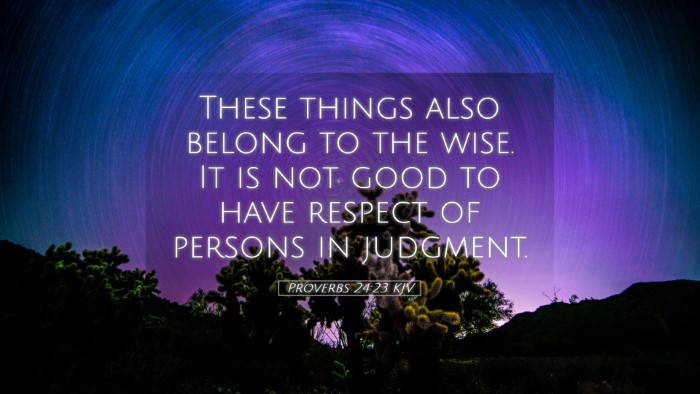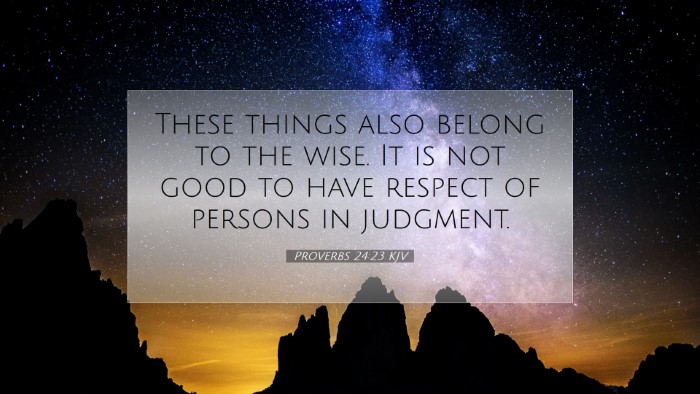Commentary on Proverbs 24:23
Proverbs 24:23 states: "These also are sayings of the wise: To show partiality in judging is not good." This verse serves as a critical reminder of the ethical standards required in judgment and decision-making, particularly for leaders, judges, and anyone in positions of authority.
Contextual Overview
In the Book of Proverbs, wisdom is personified and contrasted against foolishness. The collection of sayings in Proverbs serves not only to impart knowledge but also to offer moral direction. The particular statement found in Proverbs 24:23, introduces a specific wisdom saying that emphasizes the moral implications of partiality.
Insights from Matthew Henry
Matthew Henry, in his commentary, underscores the importance of equity and fairness in judgment. His exposition on this verse emphasizes:
- Moral Integrity: Henry points out that justice should be impartial, noting that when judges or leaders show favoritism, they corrupt the very foundation of justice and righteousness.
- Divine Expectations: He relates this verse to God's character, suggesting that since God does not show partiality, neither should His people, particularly those in leadership positions.
- Consequences of Partiality: Henry warns that showing partiality can lead to societal decay and the undermining of trust in leaders and institutions.
Insights from Albert Barnes
Albert Barnes offers a detailed examination of the phrase "To show partiality in judging." His thoughts include:
- Judicial Integrity: Barnes elaborates that the role of a judge or anyone in authority is to apply the law fairly. He asserts that any form of partiality not only discredits the authority but also endangers the social order.
- Contextual Application: He suggests that this principle is crucial in various contexts—be it familial, ecclesiastical, or civil—highlighting that impartiality reflects a commitment to justice.
- Ethical Standards: Barnes argues that the ideal of impartial judgment aligns with the broader ethical teachings of scripture, where love and truth are paramount.
Insights from Adam Clarke
Adam Clarke's commentary adds depth by investigating the implications of judgment within the community. Key points include:
- Social Responsibility: Clarke emphasizes that leaders have a profound responsibility to maintain impartiality, as their judgments affect the lives and welfare of the community.
- Human Fallibility: His reflections also acknowledge human tendencies toward bias, urging those in power to be self-aware and recognize their own potential for favoritism.
- Prayer and Discernment: Clarke encourages maintaining a posture of prayer for discernment, urging leaders to seek divine wisdom to help them judge righteously.
Theological Implications
This verse serves as a theological anchor which illustrates the nature of God’s justice and the ethical obligations of His followers. The call for impartiality echoes throughout Scripture, connecting to themes of love, righteousness, and integrity.
Divine Justice
The notion that God is just and impartial is rooted in biblical theology. Romans 2:6-11 speaks to the truth that God does not show favoritism—this societal principle is vital in reflecting God’s character in human relationships.
Practical Applications
Pastors, students, and theologians must reflect on how this wisdom can be applied in various contexts:
- Preaching and Leadership: Leaders must prioritize integrity in their decision-making processes, ensuring that their actions reflect the impartiality God desires.
- Community Engagement: Involved parties within a church or organization should promote an attitude free of bias in congregational decision-making to foster trust and unity.
- Personal Reflection: Individuals are encouraged to assess their own biases and reflect on their interactions with others, striving for a fair and loving approach in all relationships.
Conclusion
In summary, Proverbs 24:23 stands as a vital reminder of the necessity of impartial judgment in all areas of life. The insights provided by biblical commentators underscore the moral obligations held by those in authority to lead justly, reflecting the fairness of God. As faith leaders, theologians, and students engage with this verse, they are called to embody these principles in both personal and communal practice.


